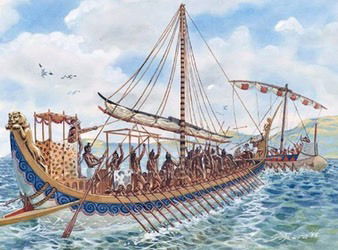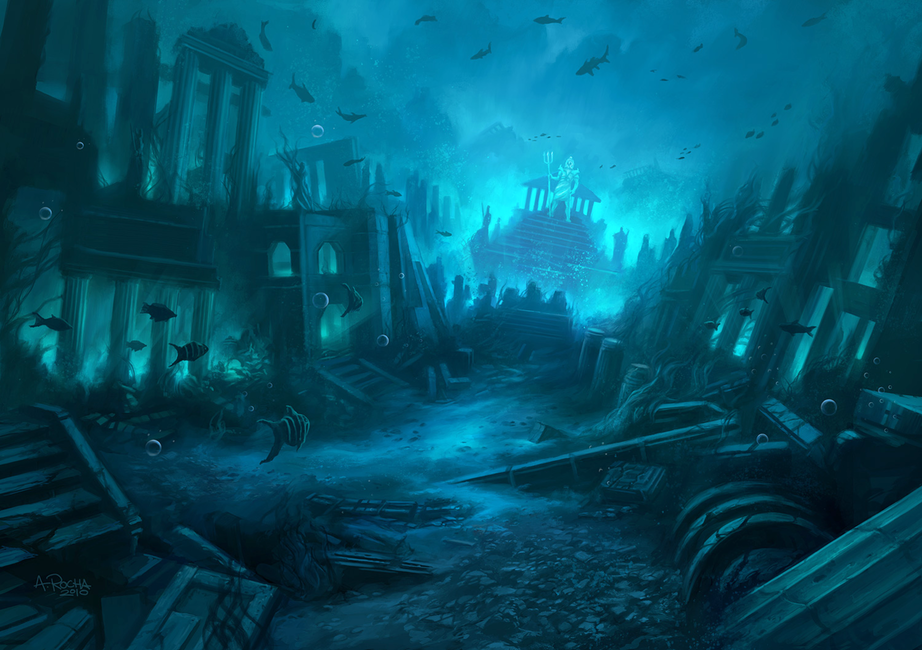RECALLING ATLANTIS

RECALLING ATLANTIS
by William Thomas
Incense, candle flicker, and my birthday present intoning secrets I’ve never told a soul… “You’ve been a sea captain for many lifetimes,” the astrologer finishes, laying aside a chart unlike any I’ve ever seen. “You took off the last survivors from Atlantis.”
Have you ever watched an advanced city-state burn? Two moons beyond the Pillars of Hercules, steering by the Punic Star and drunken yarns overheard in a seaman’s tavern at Cadiz of a “large island far out in the Atlantic, rich in gold, gems and spices,” my people are near mutiny when we sight flames capering on the horizon ahead.
Daylight finds our Hepter nosing through thick smoke and charred flotsam into a circular harbor’s outermost concentric ring. The great metropolis beyond must have been magnificent, with blossomed boulevards, comfortable residences and elaborate temples dedicated to the Sun of God arrayed before a verdant peak overlooking bountiful forests, orchards and croplands.
No more.
Beneath that smoking cinder, rival obsessions and gilded masonry lie in seared, tumbled embrace. Loaf-size pumice bumps the hull as we grope our way in noontime gloom through oily water clogged with blazing derelicts, snares of rigging and bobbing corpses.
“What happened here?” Ariela breathes.
“Take in sail,” I order the mate, batting a cinder from her tresses. “Leave a scrap to maintain headway. Ready warps and fenders. And a kedge aft.”
Losing way, errant eddies bring carrion stench and the distant cries of the damned. I glass the foreshore. Collapsed stonework and sheeting flames block every thoroughfare. Whatever befell this place had come unheralded and swift. Is everyone dead, dying or fled?
Not yet.
A buzzing in my ears. Above the inner ring a great iron machine, well-knit and smooth, rises vertically with a melodious hum. Spirals decorating downturned wings and nose, the craft tips forward, streaking towards us like a comet.
The smoke parts in obscene radiance. I just have time to think, here is a weapon to subjugate the world! when a spherical reflector switches on from the rubble. A shaft of light focuses on that boat of heaven, instantly consuming it with crackling power.
“Elah, Elah!” keens my Lioness of God, as I swing the spyglass onto bloodied stragglers huddled on a broken causeway. No purple cloaks of royalty among them. In times of collapse, only commoners have the wits to survive. “Make for that mole,” I gesture the helm. “Lay us alongside. Gently, for the love of Electra!”
And to the grim-faced mate: “Fill the scuttlebutts. Send hands aloft to douse sails and rigging.” Choking on cremated remains, I append, “Breathing is noncompulsory.”
Daubed with ash like a penitent, Ariela grins, coughs, says, “Captain, we do not have much time. See how the water boils. After-shocks – or something worse – will soon block the entrance and drown this cursed place.”
“Then we’d better look alive,” I reply.
Two days out, a second sunrise. Above the funereal pall astern, a gigantic messenger of death charged with all the power of the Universe lances down in an incandescent thunderbolt. In an instant, my memories of Atlantis vanish into legend and myth.

CONSIDERING ATLANTIS
An interview with William Thomas by William Thomas
Atlantis? Seriously? You think you were there at the end?
I was the Phoenician sea captain who took off the last survivors from Atlantis just before the final cataclysm. At least I was this told by an authority who didn't know me, but whose details of my early life were disturbingly accurate. It's fun to think so. But I have no recollection of it.
You’re claiming Atlantis actually existed?
Perhaps under another name. As bias erodes over time and our vision sharpens, we keep bumping into fragments of advanced civilizations. Read your Hancock. Consider how all indigenous cultures – including the Haida – describe the same Great Flood. This myth, now told on 146 million web pages, is archetypal in human consciousness. So something must have happened. Maybe to Thera, when it blew up. Who conclusively knows?
The Atlantis legend is best taken as parable.
Hence my bumper sticker suggestion: Looks Like Atlantis All Over Again.
Plato’s was telling another tall tale.
Plato provided topographic detail.
He liked teaching through allegory.
He had corroboration.
Except TinTin and Disney came much later.
The description of a “big island in the Atlantic” comes from Herodotus, who relates how Phoenician ships dismasted off Africa’s west coast were swept westwards on Atlantic currents to an unsuspected continent. Unlike CNN and the New York Times, ancient Greek historians did not present make-believe as fact.
So just where was this Atlantis? We’re told Thera’s caldera marks the spot. No, the Azores. Antarctica, others insist. Or down by Bimini.
Herodotus was likely referencing the Americas, where a geologically-verified cometary impact erased an entire culture.
Woo-woo alert!
Woo-woo is the official 9/11 narrative and the nightly “news”. Check out Hancock’s extensively-annotated Before America. Also, Mundus Subterraneus. The Jesuit, Kircher’s 1665 map book includes an old Egyptian chart of “Atlantis”.
And those pre-Orville flying machines?
The construction and flight characteristics of the “boats of heaven” are taken verbatim from the Samar, Vaimanika Sastra and Samara Sutradhara sacred texts of ageless India – where aircraft were commonly called Vimanas.
How did those Vedic chroniclers ever imagine atomic detonations?
I took that description directly from the Mahabharata.
Past as prologue...
Time is not linear. Ask any indigenous or Medieval person. Or physicist. Everything makes an unbroken circle. “Past” and “future” are a streaming Mobius strip without borders or beginnings.
And the rest?
Hepter sailed from Tyre. The harbor scene comes from my environmental emergency response work at Kuwait’s war-wrecked al-Shuaiba Port during the oil fires. The sounds of pumice bumping the hull I remember from Rabaul. The floating bodies we’ll get to.
You’re saying whenever the lessons of myth or history are inconvenient, we ignore them.
At our peril. Even as we mock eyewitness accounts of events that don’t jibe with our own smug – and often-proved-wrong – beliefs. Look around! Reality has never been in such disfavor. Nor whimsy so prized. Though awash in information, never have so many known so little about so much. And preferred it that way.
So, you’re transposing personal experiences with twice-told tales into your Atlantis yarn?
Just about.
Are these Atlantis musings intended as metaphors, fables or fantasies?
Warnings.